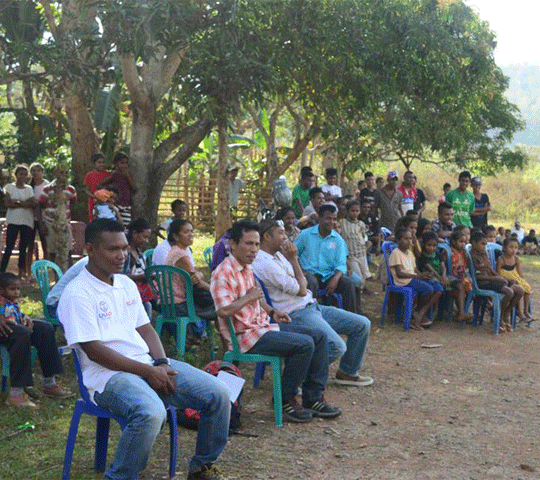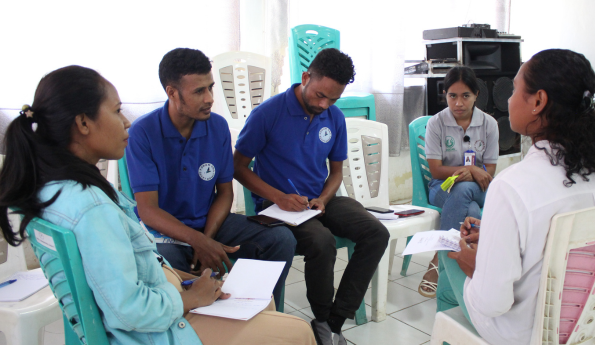In Timor-Leste’s highly patriarchal society, women are often considered second class citizens. The LGBTQI+ population and people with disabilities are often overlooked as well, with limited governmental policies supporting accessibility or inclusion for vulnerable populations. Counterpart has been implementing the USAID/Timor-Leste NGO Advocacy for Good Governance Activity in Timor-Leste since 2020, with gender equality, women’s empowerment, and inclusion a central piece of our efforts. Our local team partnered with nine local NGOs focusing on issues ranging from supporting access to healthcare and education for people with disabilities, economic development, water and sanitation, and more. Joao Fernandes Soares joined the team shortly after the project began as the gender, equity, and social inclusion (GESI) and advocacy manager, and now plays a critical role on the senior management team.
Helping to shape gender equity in Timor-Leste
When Soares started at Counterpart, he had one goal in mind: to make sure GESI was integrated across all activities. But his passion for equality and inclusion had begun years earlier. During Timor-Leste’s struggle , many parents throughout the country sent their children to live in convents and seminaries—both to ensure their safety and to make sure that they received a quality education, even while their country was in turmoil. After spending 10 years as a child living in a seminary in western Timor and receiving an education that included learning several languages, Soares graduated and got a job as an interpreter with the United Nations Population Fund (UNFPA).
In this role, Soares translated trainings on gender equity, inclusion, and preventing gender-based violence. One day, the trainer called in sick, and Soares offered to fill in as he had helped interpret the training so many times. was so impressed that they asked him to the take on the role full-time. Over the next several years, the UN trained Soares further and encouraged him to pursue a promotion as a gender-based violence training officer. He then went on to serve as a UN Women, with additional roles with the New Zealand police and the United Nations Development Programme—ultimately leading him to his role overseeing gender programming for this project.
Developing inclusive development action plans
From the moment he started, Soares began developing a plan to ensure that gender and social inclusion were prioritized across project implementation with all nine partners. The project works to strengthen the capacity of each NGO partner to better advocate for and support their communities. As part of this effort, each organization conducted a comprehensive internal GESI audit to assess their policies and procedures around gender and social inclusion. Based on those results, together with the partners, the team drafted a customized inclusive development action plan for each NGO.

Joao Soares leading a training on “unconscious bias” with the gender focal points.
To bring those action plans to life and ensure accountability, the team tasked each partner organization with identifying two gender focal points within their organizations—one female and one male—to be responsible for attending the GESI trainings. Through a training-of-trainer model, the focal points take those tactics and recommendations back to each of their organizations and are responsible for translating these best practices into more inclusive and impactful policies. As Soares explains, “It’s impossible for me to train everybody. But the focal points make this approach sustainable.”
Working through the focal points, the team provides each partner organization with trainings on gender-based violence, inclusive leadership, unconscious bias, and prevention of sexual harassment, plus annual refresher trainings. As a result of the trainings, all nine partners now have a truly comprehensive GESI policy in place. As Soares points out, the policies are “not just a requirement, we’re creating an environment that’s safe and respectful in each organisation.”
The focal points meet with Soares and the team through regular monthly GESI mentoring and quarterly capacity strengthening sessions—both one-on-one and in a group setting. While the individual meetings have been successful, the focal points complained that they were “bored” in the quarterly learning sessions. Responsive to our partners’ needs, Soares went back to the drawing board and thought creatively about how to get the most out of this time together. Under the new model, he helped the focal points that meets quarterly for a learning session. The focal points rotate hosting the sessions, with each one focused around a theme or case study of their choice.
A critical innovation Soares made was ensuring that lessons were shared far beyond just the nine partner NGOs. Soares and the focal points made the decision to open the quarterly sessions to additional Timorese civic organizations. As a result, the UN Spotlight project asked two of our partner NGOs—JSMP and Belun—to present their improved GESI policies to the broader group as a successful case study. Another partner, MAHON, presented to the community of practice on GESI design in mobilizing community and appropriately consulting children and families on school construction projects. The next session, to be led by partners ADTL and CBRNTL, will focus on appropriate language for respecting people with disabilities.

Joao Soares, center, with his colleagues in Timor-Leste supporting a march for people with disabilities, in partnership with several of the partner NGOs.
The future of gender equity and social inclusion
Looking to the last year of the Activity, Soares is turning his efforts towards learning what resources the focal points need to ensure that gender equity and inclusion remain a priority. Most NGOs have expressed an interest in training around inclusion for different populations, as well as a training on how to incorporate GESI throughout institutional policy. Soares is also developing an inclusive recruitment guide, so that recruitment across the partner organizations is fair, open, and inclusive. The team wants to expand the GESI community of practice to position it for sustainability and formalize the group to include civil society beyond just the nine partners. The wish list is long, but Soares thinks it’s worth the effort. “It’s not quick, but there is progress,” he tells us. “Realizing that women are people too and need respect. It’s not easy to change, but I see behavior change in the focal points first.”





